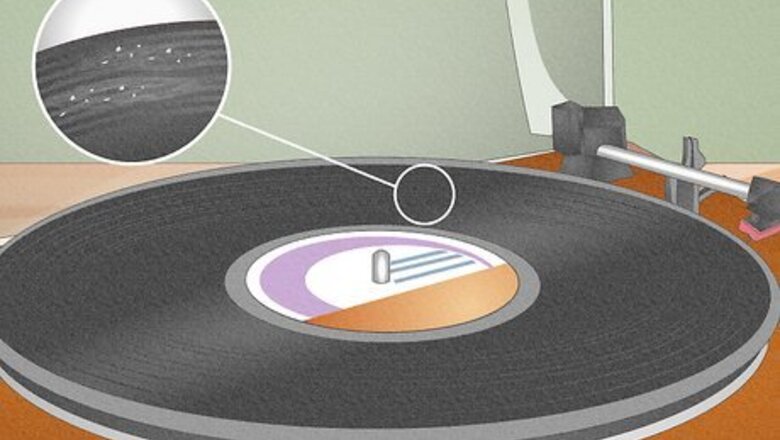
views
- Clean dust and dirt off your vinyl with an anti-static record brush. Remove debris deep in the grooves with record cleaner.
- Try cleaning the record player’s needle with a stylus brush if the stylus has buildup. Otherwise, remove and replace it with a new one.
- Rebalance the tonearm so it’s heavier by the needle to prevent it from popping out of the grooves.
- Replace vinyl records that skip if they’re severely warped or have deep scratches.
What causes a record to skip?
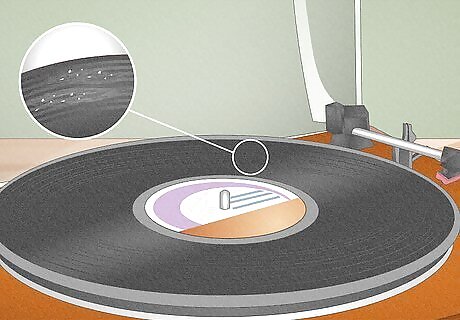
Dust or dirt on the vinyl Dust buildup is the most common reason a record starts skipping. When dirt and other debris get stuck deep in the grooves of your vinyl, it could bump the record player’s needle (stylus) out of place and make your record skip to a new spot. If you don’t see any dust or debris, try using a magnifying glass to get a better look at the grooves.
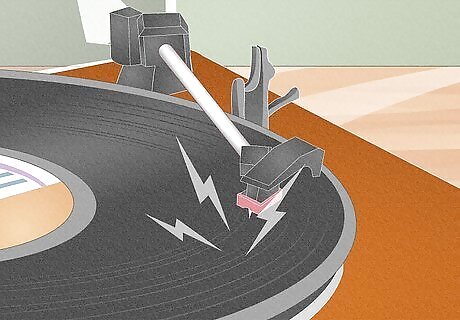
Static buildup Vinyl is really susceptible to static electricity and easily holds a charge. When you try playing your record, static could cause pops and crackles that disrupt the audio. Static also attracts more dirt and dust to your record.
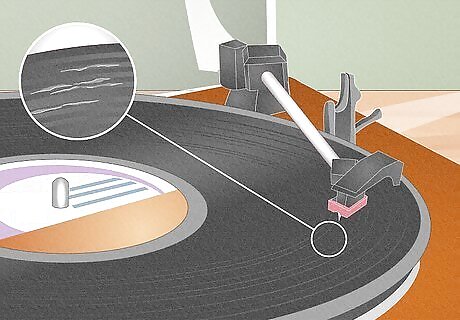
Scratches or warps on the record As the player’s needle runs along the vinyl’s grooves, it could catch on a deep scratch and move to a different part of your record. Additionally, if you have an old record with warped edges, the needle could jump as the vinyl spins on the player. Inspect your vinyl and look for any scratches or warps.
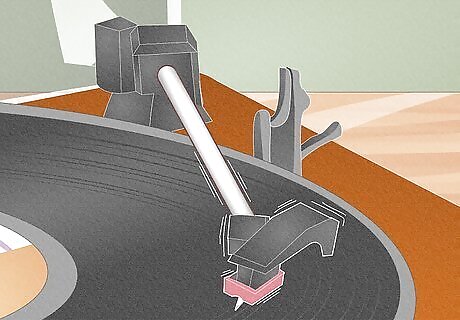
Imbalanced tonearm The tonearm is the horizontal piece of your record player with the needle at the end. The tonearm has a weight near the base to help the needle stay in the grooves of the record you’re listening to. If the tonearm isn’t properly balanced, then it could easily lift off the vinyl and jump to a new spot.
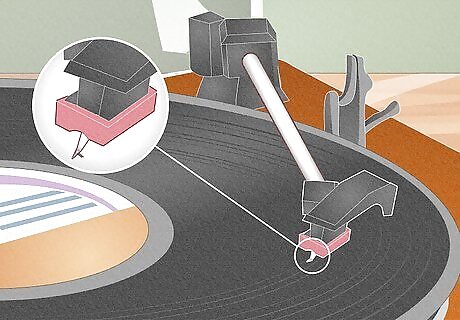
Dirty or damaged needle The more you listen to vinyl on your record player, the more dirt and dust will start to build up on the tip of the needle. When the needle tip doesn’t fit into the record’s grooves properly, it’ll pop out and skip ahead.
Fixing a Skipping Record
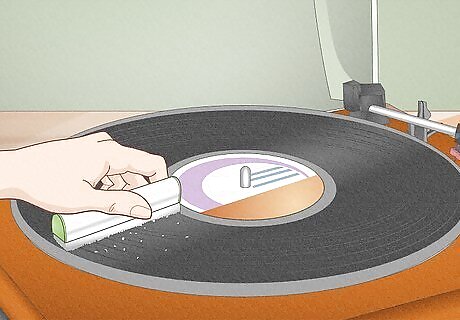
Run an anti-static record brush over your vinyl. Set your record on the player without putting the needle down, and turn it on so the vinyl starts spinning. Gently hold the bristles of your brush on the surface of your record, and move it toward the center. After 3 rotations of your record, take the brush off. An anti-static brush gets rid of any static and cleans dirt off your record.
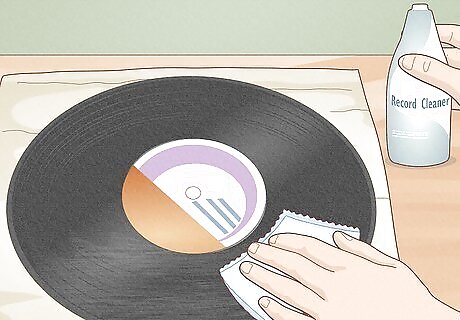
Deep-clean your vinyl with record cleaner and a microfiber cloth. Wet your cloth with the cleaning solution, and gently clean your record in a circular motion. Wipe in the same direction as the grooves to get all of the dirt and dust out. Avoid pressing the cloth down forcefully against your record so you don’t press dirt and dust deeper into the grooves.
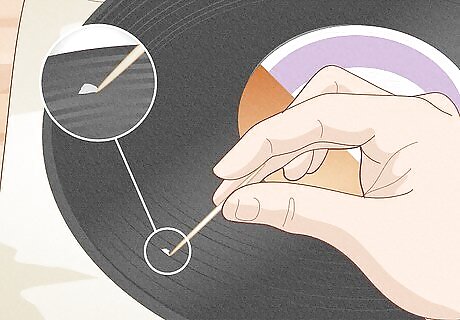
Run a toothpick or needle in the grooves of a scratched record. Find the scratched spot on your record. Slowly run the point of your toothpick or needle in the groove to help reshape them. Continue working through all the grooves that the scratch goes through before you try playing your record again. If your record still doesn’t play without skipping, then the scratch is too deep to fix.
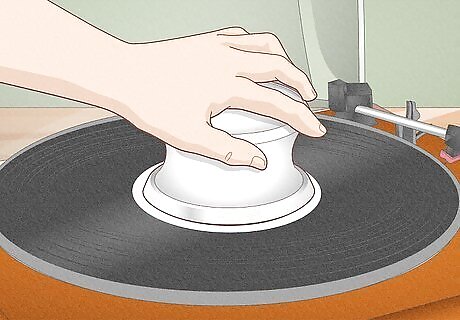
Try using a record weight for a mildly warped record. Set the record on your player like you normally would. Position the record weight on the center spindle of your record player to help flatten out some of the warps. Try playing your record to see if it still skips. If your record is so warped that a weight doesn’t flatten it or make it playable, then it’s easier to replace the vinyl instead of trying to fix it.
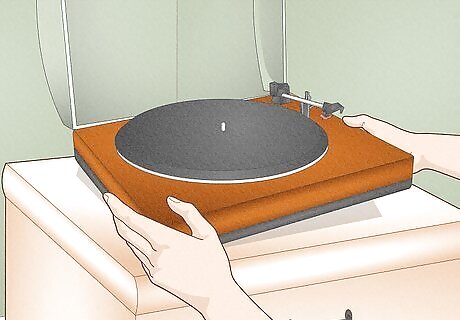
Move your record player to a level tabletop or surface. Check your record player to see if it’s on an uneven surface or wobbles at all. If you notice it moving around, try finding a flat, level table or cabinet where you can put it. Make sure your record player doesn’t shake or move around while it’s playing. If you keep your record player near a speaker or a subwoofer, loud bass noises could shake the record player and make the needle skip.
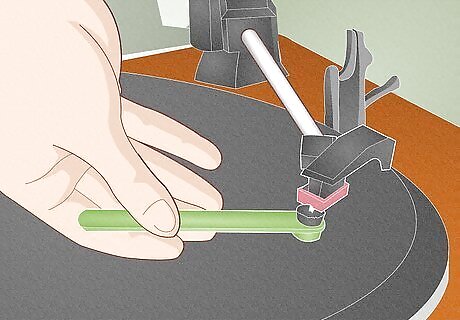
Clean the needle with a stylus cleaning brush. Run the bristles of your stylus from the back of the needle toward the front. Try to brush off as much of the buildup as you can so it fits correctly into the grooves of your vinyl. Avoid brushing the needle from side to side since you could knock it out of position and prevent your player from working properly.
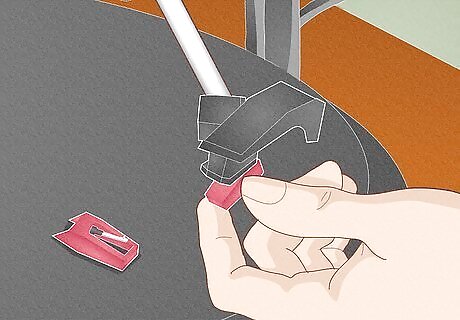
Replace a needle that’s worn out. If your needle looks bent or dull, gently insert a flat-head screwdriver into the tab above the needle on the front of the tonearm. Wiggle the screwdriver to pop out the needle. Position the new record needle in its place and gently snap it into place. If the needle doesn’t come out on its own, then you may need to replace the entire cartridge instead. As a rule of thumb, try to replace the stylus every 400 hours you use your record player. It’s normal for every needle to wear out over time, even if you have a high-end record player.
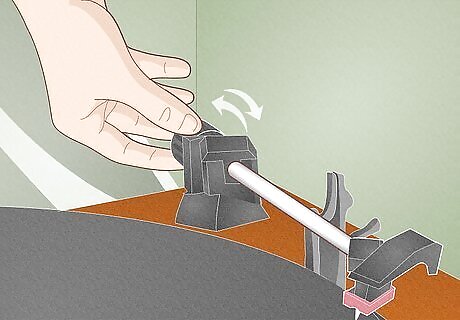
Rebalance the tonearm. Undo the clip near the base of the tonearm and hold onto the headshell (the grip next to the needle) over your player. Turn the counterweight at the base of the tonearm to adjust the balance. Keep making adjustments until the tonearm is perfectly horizontal and the needle hovers over your player without you holding it up. Find the anti-skating dial on your player and set it to “0” so the arm doesn’t move. Avoid letting the needle touch your record player since you could damage it.
Preventing Your Record from Skipping
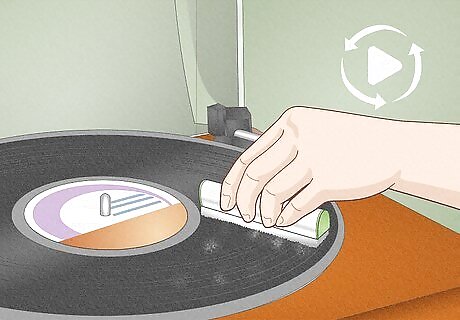
Brush your record with an anti-static brush before you play it. Turn your player on without putting the tonearm down so the record spins. Gently hold the brush bristles against the grooves of your record and move them toward the center. Let your record spin 3 times before lifting up your brush. The brush removes any pops and crackles caused by static electricity, plus it cleans off any leftover dirt or dust that might have been left on the surface.
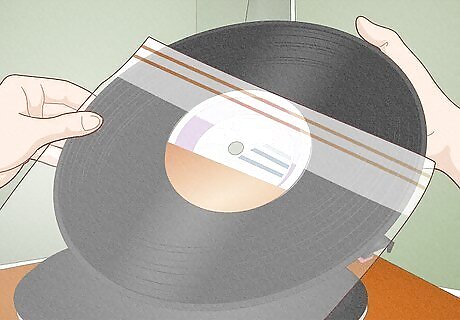
Keep your records in anti-static sleeves. Take your records out of their inner sleeves made of paper or plastic, and slide them into the anti-static ones when you store them. Since the sleeves won’t hold a charge, the sleeves prevent your records from making pops or crackles when you try to play them. Don’t forget to put outer sleeves to protect the album artwork and protect your records from dust and damage.
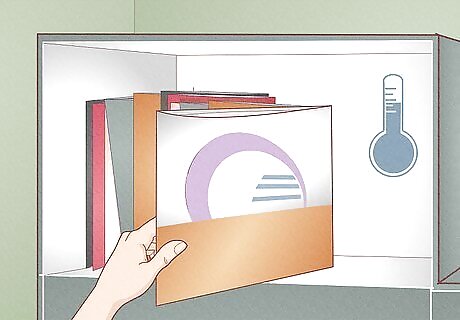
Store your records vertically in a cool place. Find a sturdy shelf or plastic storage container that’s out of direct heat or sunlight so you don’t damage your records. Keep your records upright rather than stacking them horizontally to further prevent them from warping or getting damaged. Maintain a temperature between 60–70 °F (16–21 °C) to prevent your vinyl from getting damaged. Alternatively, keep your vinyl in record cases to keep them fully protected and organized. Be careful not to pack your records too tightly on a shelf since they could start to warp or deform. Multiple vinyl records can start to get heavy, so make sure any shelves are braced with metal brackets and can support the full weight.
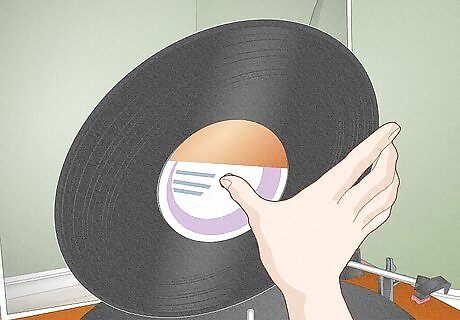
Handle your vinyl by the edges. Try to avoid touching the grooves on your records so you don’t get any dust or dirt in them. Instead of pinching your vinyl to pull it out, lightly hold the edges in your fingertips. Put your thumb on the label in the middle of the record to help support it.















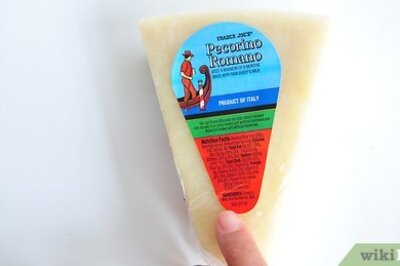




Comments
0 comment